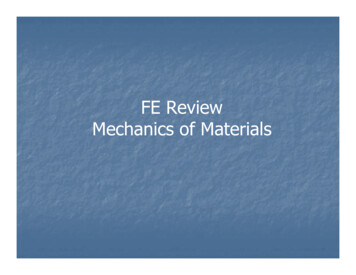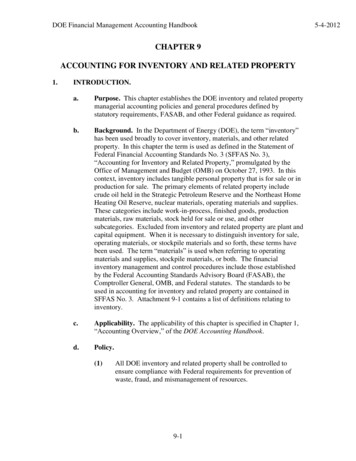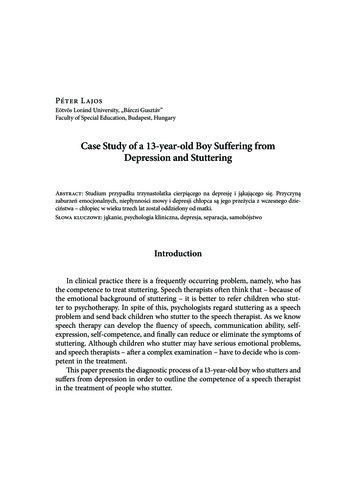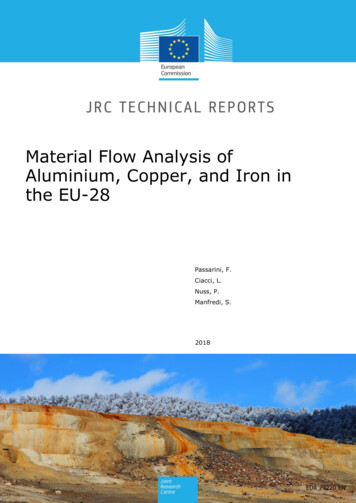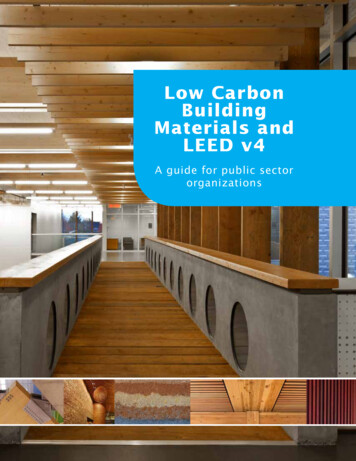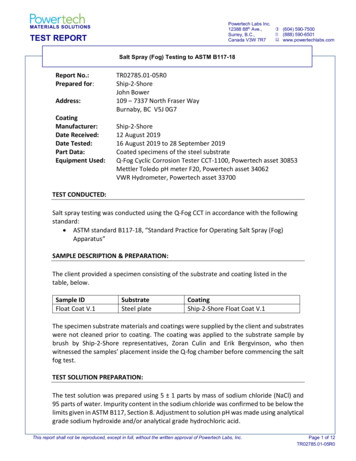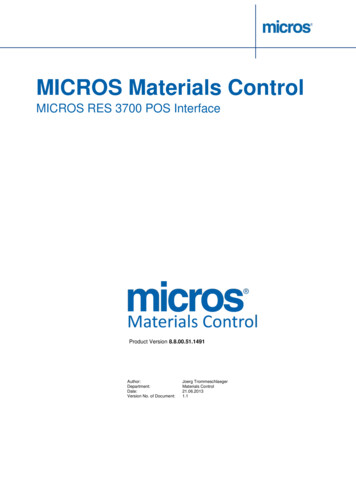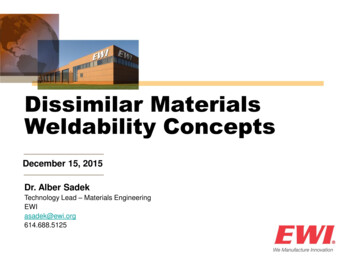
Transcription
Addis Ababa, Ethiopia2–27 February 2015STUDY MATERIALSINTERNATIONAL INVESTMENT LAWCodification Division of the United Nations Office of Legal AffairsCopyright United Nations, 2014
Addis Ababa, Ethiopia2–27 February 2015JUDGE JOAN DONOGHUECodification Division of the United Nations Office of Legal AffairsCopyright United Nations, 2014
INTERNATIONAL INVESTMENT LAWJUDGE JOAN DONOGHUEResearch Guide for International Investment Law10Basic reference materials1.2.3.4.5.6.Convention on the Settlement of Investment Disputes between States and Nationalsof Other States (ICSID Convention), Regulations and Rules, as amended in 2006ICSID Additional Facility Rules, as amended in 2006Office of the Spokesperson of the U.S. Department of State, Fact Sheet on the UnitedStates Model Bilateral Investment Treaty, 20 April 2012United States Model Bilateral Investment Treaty, 2012South African Development Community (SADC) Model Bilateral Investment TreatyTemplate with Commentary, July 2012United Nations Conference on Trade and Development (UNCTAD), InvestmentPolicy Framework for Sustainable Development, 12 July 2012Other background materials (not reproduced here)A.UNCTAD Series on Issues in International Investment Agreements (“Pink Series”)7.International Investment Agreements: Key Issues, vol. I, 2004, UNCTAD Series onissues in international investment agreements (United Nations publication, Sales No.E.05.II.D.6)International Investment Agreements: Key Issues, vol. II, 2004, UNCTAD Series onissues in international investment agreements (United Nations publication, Sales No.E.05.II.D.6)International Investment Agreements: Key Issues, vol. III, 2005, UNCTAD Series onissues in international investment agreements (United Nations publication, Sales No.E.05.II.D.6)Key Terms and Concepts in IIAs: A Glossary, UNCTAD Series on issues ininternational investment agreements (United Nations publication, Sales No.E.04.II.D.31)State Contracts, UNCTAD Series on issues in international investment agreements(United Nations publication, Sales No. E.04.II.D.5)Dispute Settlement: Investor-State, UNCTAD Series on issues in internationalinvestment agreements (United Nations publication, Sales No. E.03.II.D.5)Dispute Settlement: State-State, UNCTAD Series on issues in internationalinvestment agreements (United Nations publication, Sales No. E.03.II.D.6)Home Country Measures, UNCTAD Series on issues in international investmentagreements (United Nations publication, Sales No. E.01.II.D.19.)Host Country Operational Measures, UNCTAD Series on issues in internationalinvestment agreements (United Nations publication, Sales No. E. 01.II.D.18)National Treatment, UNCTAD Series on issues in international investmentagreements, vol. IV (United Nations publication, Sales No. 4248
17. International Investment Agreements: Flexibility for Development, UNCTAD Serieson issues in international investment agreements (United Nations publication, SalesNo. E.00.II.D.6)18. Taking of Property, UNCTAD Series on issues in international investmentagreements, (United Nations publication, Sales No. E.00.II.D.4)19. Admission and Establishment, UNCTAD Series on issues in international investmentagreements (United Nations publication, Sales No. E.99.II.D.10)20. Trends in International Investment Agreements: an Overview, UNCTAD Series onissues in international investment agreements (United Nations publication, SalesNo. E.99.II.D.23)21. Lessons from the MAI, UNCTAD Series on issues in international investmentagreements (United Nations publication, Sales No. E. 99.II.D.26)22. Fair and Equitable Treatment, UNCTAD Series on issues in international investmentagreements, vol. III (United Nations publication, Sales No. E. 99.II.D.15)23. Scope and Definition, UNCTAD Series on issues in international investmentagreements, vol. II (United Nations publication, Sales No. E. 99.II.D.9)24. Most-Favoured-National Treatment, UNCTAD Series on issues in internationalinvestment agreements, vol. III (United Nations publication, Sales No. E.99.II.D.11)B.UNCTAD Series on Issues in International Investment Agreements II25. Expropriation, UNCTAD Series on issues in international investment agreements II,(United Nations publication, Sales No. E.12.II.D.7)26. Scope and Definition (A Sequel), UNCTAD Series on issues in internationalinvestment agreements II (United Nations publication, Sales No. E.11.II.D.9)27. Most-Favoured-National Treatment (A Sequel), UNCTAD Series on issues ininternational investment agreements II (United Nations publication, SalesNo. 10.II.D.19)28. Fair and Equitable Treatment (A Sequel), UNCTAD Series on issues in internationalinvestment agreements II (United Nations publication, Sales No. E.11.II.D.15)29. Investor-State Dispute Settlement (A Sequel), UNCTAD Series on issues ininternational investment agreements II (United Nations publication, Sales No. 13II.D.8C.UNCTAD Series on International Investment Policies for Development30. Investor-State Disputes: Prevention and Alternatives to Arbitration II: Proceedingsof Symposium held on 29 March 2010, UNCTAD Series on International InvestmentPolicies for Development (United Nations publication)31. Investor-State Disputes: Prevention and Alternatives to Arbitration, UNCTADSeries on International Investment Policies for Development (United Nationspublication, Sales No. E.10.II.D.11)32. The Role of International Investment Agreements in Attracting Foreign DirectInvestment to Developing Countries, UNCTAD Series International InvestmentPolicies for Development (United Nations publication, Sales No. E.09.II.D.20)33. The protection of national security in IIAs, UNCTAD Series on InternationalInvestment Policies for Development (United Nations publication, Sales No.E.09.II.D.12)
34. International Investment rule-making: stocktaking, challenges and the way forward,UNCTAD Series on International Investment Policies for Development (UnitedNations publication, Sales No. E.08.II.D.1)35. Identifying core elements in investment agreements in the APEC region, UNCTADSeries on International Investment Policies for Development (United Nationspublication, Sales No. E.08.II.D.27)36. Investment Promotion Provisions in International Investment Agreements, UNCTADSeries on International Investment Policies for Development (United Nationspublication, Sales No. E.08.II.D.5)37. Investor-State Dispute Settlement and Impact on Investment Rulemaking, UNCTADSeries on International Investment Policies for Development (United Nationspublication, Sales No. E.07.II.D.10)38. Preserving Flexibility in IIAs: the Use of Reservations, UNCTAD Series onInternational Investment Policies for Development (United Nations publication,Sales No. E.06.II.D.14)39. International Investment Arrangements: Trends and Emerging Issues, UNCTADSeries on International Investment Policies for Development (United Nationspublication, Sales No. E.06.II.D.3)40. Investor-State Disputes Arising from Investment Treaties: A Review, UNCTADSeries on International Investment Policies for Development (United Nationspublication, Sales No. E.06.II.D.1)41. South-South Cooperation in International Investment Arrangements, UNCTADSeries on International Investment Policies for Development (United Nationspublication, Sales No. E.5.II.D.26)42. International Investment Agreements in Services, UNCTAD Series on InternationalInvestment Policies for Development (United Nations publication, Sales No.E.05.II.D.15)43. The REIO Exception in MFN Treatment Clauses, UNCTAD Series on InternationalInvestment Policies for Development (United Nations publication, Sales No.E.05.II.D.1)D.UNCTAD Issues Notes44. Reform of the IIA Regime: Four Paths of Action and a Way Forward, UNCTAD IIAIssues Note, No. 3, June 2014E.International Institute for Sustainable Development45. Howard Mann et al., IISD Model International Agreement on Investment forSustainable Development: Negotiator’s Handbook, International Institute forSustainable Development, 2d. ed., 200646. Nathalie Bernasconi-Osterwalder et al. (eds.), International Investment Law andSustainable Development: Key Cases from 2000-2010, International Institute forSustainable Development, 2011, p. 17847. Nathalie Bernasconi-Osterwalder et al. (eds.), Investment Treaties and Why TheyMatter to Sustainable Development, International Institute for SustainableDevelopment, 2012, p. 54
Research Guide for International Investment Law
RESEARCH GUIDE FOR INTERNATIONAL INVESTMENT LAW(All URLs last checked on 31 October 2014)This document offers an overview of freely available online services and resources in thefield of international investment law generally and investor-state dispute settlement, inparticular.I.1.Finding investment treatiesUnited Nations Conference on Trade and Development (UNCTAD)Investment Instruments OnlineUnder its Investment Instruments Online program, UNCTAD offers several ways forlocating the texts of international investment agreements (IIAs). The regularly updateddatabase is based on electronic versions of bilateral investment agreements (BITs) madeavailable by a number of countries on their official websites, as well as the printedversions available from official national and international collections and publications.The collection may include texts of BITs that are no longer in force or agreements thathave not yet entered into force. Although this is the most comprehensive freely availablecollection of investment treaty texts, it does not provide an exhaustive or authoritativelisting of all IIAs. The UNCTAD database offers the following specific resources:A.IIA rch.aspx?id 780The IIA Compendium is a collection of bilateral, regional andmultilateral instruments relating to cross-border investment. TheCompendium is searchable by keywords (e.g. “expropriation”), countries,the type of instrument, and the year of conclusion.B.BITs Search Enginehttp://www.unctadxi.org/templates/DocSearch 779.aspxThe BITs search engine provides a user-friendly way to retrievethe text of: (i) all BITs signed by one country; or, (ii) a specific BITbetween two countries.C.Country-Specific Lists of is regularly updated resource provides a country-wise list ofBITs, as well as their dates of signature and entry into force, for 180countries (last updated on 1 June 2012). It does not provide the full text ofthe treaties, but only an exhaustive list of treaties signed or in force.10
2.Websites of National Governments and MinistriesSince the UNCTAD database is not exhaustive, it is often useful to consult the websitesof the relevant national governments. In some cases, the official websites of nationalgovernments (e.g., the websites of the ministries of foreign affairs, economic affairs,commerce, or foreign trade), provide a list and texts of all BITs concluded by a country.Sometimes government websites also include the text of a “model” BIT. Further, sinceinvestment agreements are not always concluded in the form of self-contained BITs andare often included in trade agreements as investment “chapters”, it may be useful to lookat the texts of these trade agreements, also usually available on the websites of thenational ministries of commerce or foreign trade.3.Investment Treaty Arbitration (ITA)http://italaw.com/investment-treatiesIn addition to BITs and trade agreements with investment chapters, ITA provides thetexts of several model BITs and links to the relevant websites of several nationalgovernments and ministries.II.1.Finding arbitral awards and decisionsInvestment Treaty Arbitration (ITA)http://italaw.comItalaw, managed by Professor Andrew Newcombe of the University of Victoria, providesaccess to all publicly available investment treaty arbitration awards and decisions. Thedatabase covers proceedings under several arbitration rules and fora (e.g., InternationalCentre for Settlement of Investment Disputes (ICSID), Permanent Court of Arbitration(PCA), United Nations Commission on International Trade Law (UNCITRAL) Rules,etc.), as well as enforcement proceedings in different jurisdictions. The database issearchable by several criteria, such as the claimant, respondent state, governing treaty,and the date of the award. The site also provides a free subscription for regular emailupdates of latest awards and decisions.2.Digest of International Investment Law This resource by the University of Cologne provides a user-friendly way of locatingstatements and observations made by different arbitral tribunals on specific legal issuesand treaty provisions.11
3.International Investment Arbitration Public Policy ts/IIAPP, run by Professor Gus Van Harten of Osgoode Hall Law School, provides a free,searchable database of all publicly known investment treaty arbitration cases up to May2010. In addition to the usual search criteria of claimants, respondent states and treaties,the database can be searched by arbitrators, and the different areas of the host State’snational regulatory policy at issue (e.g., agriculture, public health, water, indigenousrights, land use, etc.).III.1.News and CommentaryInvestment Treaty News (ITN)http://www.iisd.org/itn/ITN is a free quarterly newsletter published by the International Institute for SustainableDevelopment providing news, analysis and opinion on arbitration proceedings anddevelopments relating to investment treaties, arbitration rules and negotiations. Thenewsletter offers a free subscription service.2.UNCTAD Investment Policy Hub (IPH)http://investmentpolicyhub.unctad.org/The UNCTAD IPH provides a useful collection of resources and publications oninternational investment law and investment policy:A.Investment Policy Framework for Sustainable iews/Public/IndexIPFSD.aspxBuilding upon UNCTAD’s accumulated expertise on national andinternational investment policymaking, the IPFSD provides guidelines fordesigning national investment policies and options for the design and useof international investment agreements.B.UNCTAD Investment Policy Review Policy%20Reviews/Investment-Policy-Reviews.aspxThe IPR provides an objective evaluation of countries’ legal,regulatory and institutional framework to attract foreign direct investment(FDI), including a review of FDI entry and establishment requirements,treatment and protection of investment, taxation, and other sectoralregulations.12
C.UNCTAD Best Practices on Investment for t-for-Development.aspxThis series provides advice on best practices in investment policieswhich can maximize the contribution of FDI inflow to nationaldevelopment strategies.D.UNCTAD Investment Policy Monitor The IPM is a periodic newsletter published by UNCTAD reportingon the latest developments in national and international investment lawand policy.E.UNCTAD Series on International Investment Agreements (IIA):The “Pink Series” (1999-2005) and IIA II (2011- )IIA I nts.aspxIIA II (2011- ional-InvestmentAgreements-II.aspxThis series of booklets explores key legal concepts and issuesrelated to international investment agreements. Each booklet focuses on aparticular issue (e.g., MFN, expropriation, etc.), and includes an analysisof state practice and investment arbitration awards, in addition to offeringpolicy options and advice.F.UNCTAD International Investment Agreements: Issue InvestmentAgreements---Issues-Note.aspxThese occasional Issue Notes provide a brief analysis andcommentary on select developments relating to international investmentagreements and investor-state dispute settlement.3.Organization for Economic Co-operation and Development (OECD)Working Papers on International olicy/working-papers.htmThe OECD Working Paper series publishes selected studies by the OECD InvestmentCommittee, OECD Investment Division staff, or by outside consultants working onOECD Investment Committee projects. The series covers a variety of issues underinternational investment agreements and investment arbitration, apart from nationalinvestment policies.13
4.Columbia FDI lumbia-fdi-perspectives-0The FDI Perspectives is an occasional series by the Columbia Center on SustainableInvestment at Columbia University providing topical analysis and commentary on issuesrelating to FDI.5.Kluwer Arbitration Bloghttp://kluwerarbitrationblog.com/This blog provides commentary by lawyers and academics on current developments ininternational investment law and arbitration proceedings, in particular.6.A Canon for Arbitration and Investment m/This blog provides a collection (a “canon”) of significant scholarship in the field ofinternational investment law and arbitration, along with a review of these works.IV.Mailing ListsMailing lists (also known as “list-servs”) are a useful way of interacting withinternational lawyers, academics and other professionals working in the field ofinternational investment law across the world. As a member one can participate indiscussions and share information through email exchanges. Membership requires anapplication, and must be approved. There are two free mailing lists that focus oninternational investment -management.com/young-ogemid/Young-OGEMID is a mailing list for younger professionals practicing in the field ofinternational investment law and international arbitration. Although covering a variety ofissues, it maintains a strong focus on the practice of dispute settlement.14
V.1.MultimediaUN Audiovisual Library of International Law (AVL)http://www.un.org/law/avl/The UN AVL is a multimedia collection of lectures delivered by leading internationallaw scholars and practitioners covering a range of international law fields and issues.Some lectures are accompanied by a suggested list for further reading and research. Thesection on “Foreign Investment” under “International Economic Law” contains lecturesdirectly relevant to international investment tml#intlecon). Other categories also containlectures on related issues such as the protection of individuals, international arbitration,state responsibility and dispute settlement, etc. The AVL is updated regularly to includenew lectures.VI.1.Further Research and ReadingColumbia Center on Sustainable Investmenthttp://ccsi.columbia.edu/The Vale Columbia Center offers a variety of guides, reports and publications on crossborder investment flows. In addition, as part of the International Investment LawSyllabus Project, the Center provides model syllabi for academic courses on internationalinvestment law.2.UN AVL Research ary.htmlThe Research Library of the AVL provides links to other web-based international lawrelated resources. Specifically, it covers: resources relating to treaties and treaty statusinformation; materials concerning the jurisprudence of international courts and tribunals;access to selected United Nations publications and to repositories of officialdocumentation; and selected scholarly writings in international law, includingpublications and journal articles. A collection of significant scholarly works is providedby HeinOnline and can be accessed through the AVL Research Library for Electronic Research GuidesSeveral institutions offer comprehensive research guides on international investment lawand investment arbitration, covering free and paid, online and print resources:15
A.The American Society of International Law Guide to ElectronicResources for International Economic ce-guide-ergB.The Peace Palace Library Research Guide for ent/C.The Georgetown Law Library International Investment LawResearch h/guides/InternationalInvestmentLaw.cfmD.The Washington University Law Library International InvestmentLaw Guidehttp://law.wustl.edu/library/pages.aspx?id 1373# 1 4**Judge Joan DonoghueShashank KumarDecember 2012(Updated October 2014)16
Convention on the Settlement of Investment Disputes betweenStates and Nationals of Other States (ICSID Convention),Regulations and Rules, as amended in 2006
18International Centre forSettlement of Investment Disputes1818 H Street, N.W.Washington, D.C. 20433, U.S.A.ICSID CONVENTION,REGULATIONSAND RULESICSID/15. Not for resale .April 2006
1973Rules of Procedure for the Institution of Conciliation andArbitration Proceedings (Institution Rules) . . . . . . . . . . . . . . . . . .39951Administrative and Financial Regulations . . . . . . . . . . . . . . . . . . . .Rules of Procedure for Arbitration Proceedings(Arbitration Rules) . . . . . . . . . . . . . . . . . . . . . . . . . . . . . . . . . . . . . . .35Report of the Executive Directors of the International Bank forReconstruction and Development on the Convention on theSettlement of Investment Disputes between States and Nationalsof Other States . . . . . . . . . . . . . . . . . . . . . . . . . . . . . . . . . . . . . . . . . .817Convention on the Settlement of Investment Disputes betweenStates and Nationals of Other States . . . . . . . . . . . . . . . . . . . . . . . . .Rules of Procedure for Conciliation Proceedings(Conciliation Rules) . . . . . . . . . . . . . . . . . . . . . . . . . . . . . . . . . . . . . .5PageIntroduction . . . . . . . . . . . . . . . . . . . . . . . . . . . . . . . . . . . . . . . . . . . .Summary Table of Contents5The International Centre for Settlement of Investment Disputes(ICSID or the Centre) is established by the Convention on the Settlement of Investment Disputes between States and Nationals of OtherStates (the ICSID Convention or the Convention). The Convention wasformulated by the Executive Directors of the International Bank forReconstruction and Development (the World Bank). On March 18,1965, the Executive Directors submitted the Convention, with anaccompanying Report, to member governments of the World Bank fortheir consideration of the Convention with a view to its signature andratification. The Convention entered into force on October 14, 1966,when it had been ratified by 20 countries. As at April 10, 2006, 143countries have ratified the Convention to become Contracting States.In accordance with the provisions of the Convention, ICSID provides facilities for conciliation and arbitration of investment disputesbetween Contracting States and nationals of other Contracting States.The provisions of the ICSID Convention are complemented by Regulations and Rules adopted by the Administrative Council of the Centrepursuant to Article 6(1)(a)–(c) of the Convention (the ICSID Regulations and Rules).The ICSID Regulations and Rules comprise Administrative andFinancial Regulations; Rules of Procedure for the Institution of Conciliation and Arbitration Proceedings (Institution Rules); Rules of Procedurefor Conciliation Proceedings (Conciliation Rules); and Rules of Procedure for Arbitration Proceedings (Arbitration Rules). The latest amendments of the ICSID Regulations and Rules adopted by the AdministrativeCouncil of the Centre came into effect on April 10, 2006.Reprinted in this booklet are the ICSID Convention, the Report ofthe Executive Directors of the World Bank on the Convention, and theICSID Regulations and Rules as amended effective April 10, 2006.Introduction
20CONVENTION ON THESETTLEMENT OF INVESTMENTDISPUTES BETWEEN STATES ANDNATIONALS OF OTHER STATES7Convention
21Cost of ProceedingsPlace of ProceedingsVIVIIArbitrationRequest for ArbitrationConstitution of the TribunalPowers and Functions ofthe TribunalThe AwardInterpretation, Revision andAnnulment of the AwardRecognition and Enforcementof the AwardReplacement and Disqualificationof Conciliators and Arbitrators645123VIV3ConciliationRequest for ConciliationConstitution of the ConciliationCommissionConciliation Proceedings12IIIInternational Centre forSettlement of Investment DisputesEstablishment and OrganizationThe Administrative CouncilThe SecretariatThe PanelsFinancing the CentreStatus, Immunities and PrivilegesPreambleJurisdiction of the Centre123456SectionIIIChapterTable of 8-24ArticlesCONVENTION ON THE SETTLEMENT OFINVESTMENT DISPUTES BETWEEN STATESAND NATIONALS OF OTHER STATESConventionConventionFinal ProvisionsX10AmendmentIXSignature ClauseDisputes Between ContractingStatesVIII67-7565-666433313030
2211Considering the need for international cooperation for economicdevelopment, and the role of private international investment therein;Bearing in mind the possibility that from time to time disputesmay arise in connection with such investment between ContractingStates and nationals of other Contracting States;Recognizing that while such disputes would usually be subject tonational legal processes, international methods of settlement may beappropriate in certain cases;Attaching particular importance to the availability of facilities forinternational conciliation or arbitration to which Contracting Statesand nationals of other Contracting States may submit such disputes ifthey so desire;Desiring to establish such facilities under the auspices of the International Bank for Reconstruction and Development;Recognizing that mutual consent by the parties to submit such disputes to conciliation or to arbitration through such facilities constitutesa binding agreement which requires in particular that due consideration be given to any recommendation of conciliators, and that any arbitral award be complied with; andDeclaring that no Contracting State shall by the mere fact of its ratification, acceptance or approval of this Convention and without itsconsent be deemed to be under any obligation to submit any particulardispute to conciliation or arbitration,Have agreed as follows:The Contracting StatesPreambleCONVENTION ON THESETTLEMENT OF INVESTMENT DISPUTESBETWEEN STATES AND NATIONALSOF OTHER STATESConventionConvention12The President of the Bank shall be ex officio Chairman of theAdministrative Council (hereinafter called the Chairman) but shallArticle 5(1) The Administrative Council shall be composed of one representative of each Contracting State. An alternate may act as representative in case of his principal’s absence from a meeting or inability to act.(2) In the absence of a contrary designation, each governor andalternate governor of the Bank appointed by a Contracting State shallbe ex officio its representative and its alternate respectively.Article 4Section 2The Administrative CouncilThe Centre shall have an Administrative Council and a Secretariatand shall maintain a Panel of Conciliators and a Panel of Arbitrators.Article 3The seat of the Centre shall be at the principal office of the International Bank for Reconstruction and Development (hereinafter calledthe Bank). The seat may be moved to another place by decision of theAdministrative Council adopted by a majority of two-thirds of itsmembers.Article 2(1) There is hereby established the International Centre for Settlement of Investment Disputes (hereinafter called the Centre).(2) The purpose of the Centre shall be to provide facilities for conciliation and arbitration of investment disputes between ContractingStates and nationals of other Contracting States in accordance with theprovisions of this Convention.Article 1Section 1Establishment and OrganizationChapter IInternational Centre forSettlement of Investment Disputes
2313(1) The Administrative Council shall hold an annual meeting andsuch other meetings as may be determined by the Council, or convenedby the Chairman, or convened by the Secretary-General at the requestof not less than five members of the Council.(2) Each member of the Administrative Council shall have onevote and, except as otherwise herein provided, all matters before theCouncil shall be decided by a majority of the votes cast.(3) A quorum for any meeting of the Administrative Council shallbe a majority of its members.Article 7(1) Without prejudice to the powers and functions vested in it byother provisions of this Convention, the Administrative Council shall:(a) adopt the administrative and financial regulations of theCentre;(b) adopt the rules of procedure for the institution of conciliation and arbitration proceedings;(c) adopt the rules of procedure for conciliation and arbitration proceedings (hereinafter called the Conciliation Rulesand the Arbitration Rules);(d) approve arrangements with the Bank for the use of theBank’s administrative facilities and services;(e) determine the conditions of service of the Secretary-General and of any Deputy Secretary-General;(f) adopt the annual budget of revenues and expenditures ofthe Centre;(g) approve the annual report on the operation of the Centre.The decisions referred to in sub-p
9. International Investment Agreements: Key Issues , vol. III, 2005, UNCTAD Series on issues in international investment agreements (United Nations publication, Sales No. E.05.II.D.6) 10. Key Terms and Concepts in IIAs: A Glossary, UNCTAD Series on issues in international investment agreements (United Nations publication, Sales No. E.04.II.D.31)
